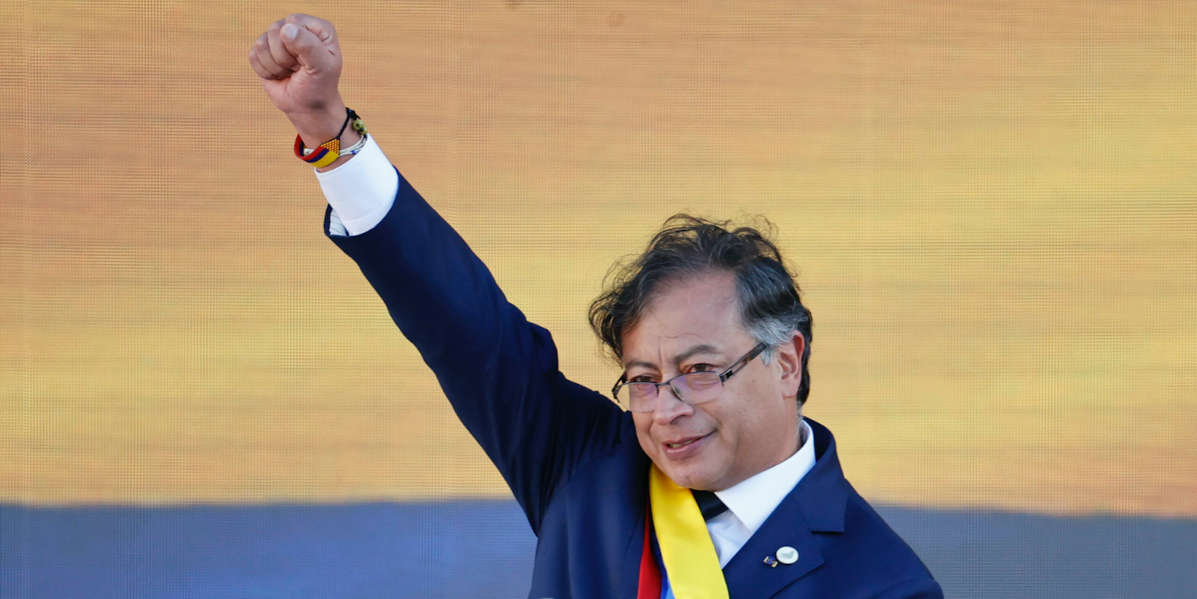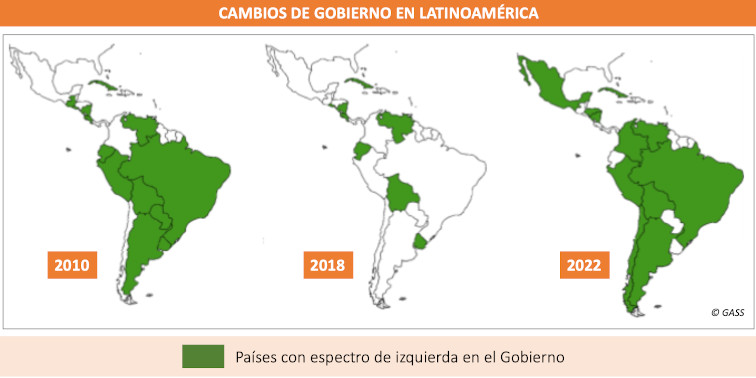Pendulum
After democracy was achieved in the last two decades of the 20th century, Latin America experienced a first wave of leftists in the late 1990s, also known as the "pink tide". Hugo Chávez began to govern Venezuela in 1999. In 2003, Lula da Silva came to power in Brazil and Néstor Kirchner in Argentina. Michelle Bachelet won the presidential elections in Chile in 2006, as did Evo Morales in Bolivia. A year later, Rafael Correa in Ecuador and Daniel Ortega in Nicaragua were victorious, while José Mujica became president of Uruguay in 2010. This political wave, which some political scientists have called the "Bolivarian cycle" due to the weight of the figure of Chávez and the populist tone that spread to other related governments (among the above mentioned there were some exceptions), was partly a response to social discontent with the economic measures, branded as neoliberalism, which the economic crises of the time had forced to be taken. These governments benefited from the "golden decade" of commodity prices (2003-2013), which generated an economic boom in most countries. After that moment, in 2015 the pendulum began to swing to the right, with the victory of Mauricio Macri in Argentina and Jair Bolsonaro in Brazil.
This new turn, however, was not as wide as the one that had been marked by the arrival to power of Chávez. Thus, although some other country went on to have a right-wing president -Sebastián Piñera returned to La Moneda in 2018 and Guillermo Lasso won in Ecuador in 2021- there were triumphs for the left in other places, such as the 2019 of Andrés Manuel López Obrador in Mexico and the 2021 of Xiomara Castro in Honduras and Pedro Castillo in Peru, in a trend that has continued with the last elections referred to above. The right-wing governments were unable to solve the serious problems that were arriving -the management of Covid and the subsequent inflationary front aggravated by the war in Ukraine- and it is likely that neither will the left-wing ones emerge particularly victorious from the current difficult conjuncture. Ultimately written request, the political swings seen in the region are more about a punishment vote for the incumbent at any given moment than an ideological dispute. "The population does not vote for the left for ideological reasons, it votes because it wants to punish and wants to try something different", suggest some analysts.
In any case, it is important to make a distinction between the two leftist waves. 1) First of all, it can be said that the leaders of the "Bolivarian cycle" had some of them a more authoritarian disposition, forcing legality for their permanence in power beyond the mandates initially allowed, and extended their control to other State institutions; although some did not have this profile at all, in general they participated in the alliances promoted by Chávez. 2) The diary was also different, since previously oil exploitation and other extractive economies were a priority, while the diary especially of Boric and Petro emphasizes the environment and gender equity. 3) On the other hand, these new governments have tried to distance themselves from the current dictatorships of Venezuela and Nicaragua (Nicolas Maduro has called the Chilean president a "coward"). Thus, we are living a new generation of the left, distanced from the "pink tide" of the first decade of the century (it is called pink, because it was not communist-red). And we should add two other elements, related to the greater difficulties encountered by the new leaders: 4) the current rulers no longer benefit from a period of economic bonanza, but their management has to face the inflationary spiral, and 5) they start with very slim majorities, or even in a minority status , in their respective national assemblies.
Unasur
The coincidence over time of governments of a similar political orientation should in theory facilitate a better performance of regional integration and regional organizations. The problem in Latin America is that it is very difficult to unite right-wing and left-wing governments in a cooperative purpose : reality speaks of different regional blocs that have varied over time. This ideological division has harmed the progress of processes such as the Andean Community or Mercosur and has been particularly evident in the last twenty years.
The Union of South American Nations (Unasur) was born in 2008 and came into operation in 2011 under the impulse of Lula's Brazil, from a previous germ promoted by Chavez, who in turn, hand in hand with Fidel Castro, launched the Bolivarian political alliance of ALBA. Unasur had as goal to advance in cooperation in different areas (economic, social, cultural and defense, mainly) and managed to seat the 12 countries of South America at the same table on a regular basis. But the support provided in many cases to the diary chavista, led to the fact that when around 2015 the "Bolivarian cycle" began to run out and the issue of right-wing governments increased, several of them decided to leave the organization. Today, only 5 countries are officially part of it (Venezuela, Uruguay, Bolivia, Guyana and Suriname).
The right-wing wave gave birth to a substitute organization, with the same purpose of South American cooperation. It was ProSur, "a mechanism and space for dialogue and cooperation of all South American countries, to advance towards a more effective integration, allowing growth, progress and development of South American countries", as formally proclaimed by the forum promoted by the Colombian Iván Duque and the Chilean Piñera, with the partnership of the Argentine Macri. Feeling in a minority, the left reacted by raising the Puebla Forum, an initiative of López Obrador, supported by Macri's successor, the Peronist Alberto Fernández.
Now that the tables have turned again, what will happen to regional integration organizations such as ProSur? Will there be a resurrection of Unasur?
Last November 15, seven leftist former presidents sent a letter to the current leaders of all South American countries calling for the reactivation of Unasur. "An urgent intervention is required from multilateral organizations, which today are unfortunately weakened and often impotent", said the text, whose careful reading actually evidenced a politicization that they claimed to want to overcome.
There is no shortage of analyses that consider that Lula's return will allow to articulate again a project like Unasur (without Brazil a South American regional organization is lame), while in the broader Latin American sphere it can also boost the Community of Latin American and Caribbean States (CELAC), whose flame has been rekindled by López Obrador. For the success of Unasur, or of a similar organization if it is decided to generate something new, some things will have to be changed in its old functioning and not fall into the temptation of politicization and oppression of pluralism.
But the confrontation demonstrated in the appointment of the new president of the Inter-American Bank development (IDB) -Lula supported the election of the Brazilian Ilan Goldfajn, proposed by Bolsonaro, against the candidate launched by López Obrador and the one promoted by Boric- suggests that regional integration, if it advances, will do so slowly and with setbacks.


